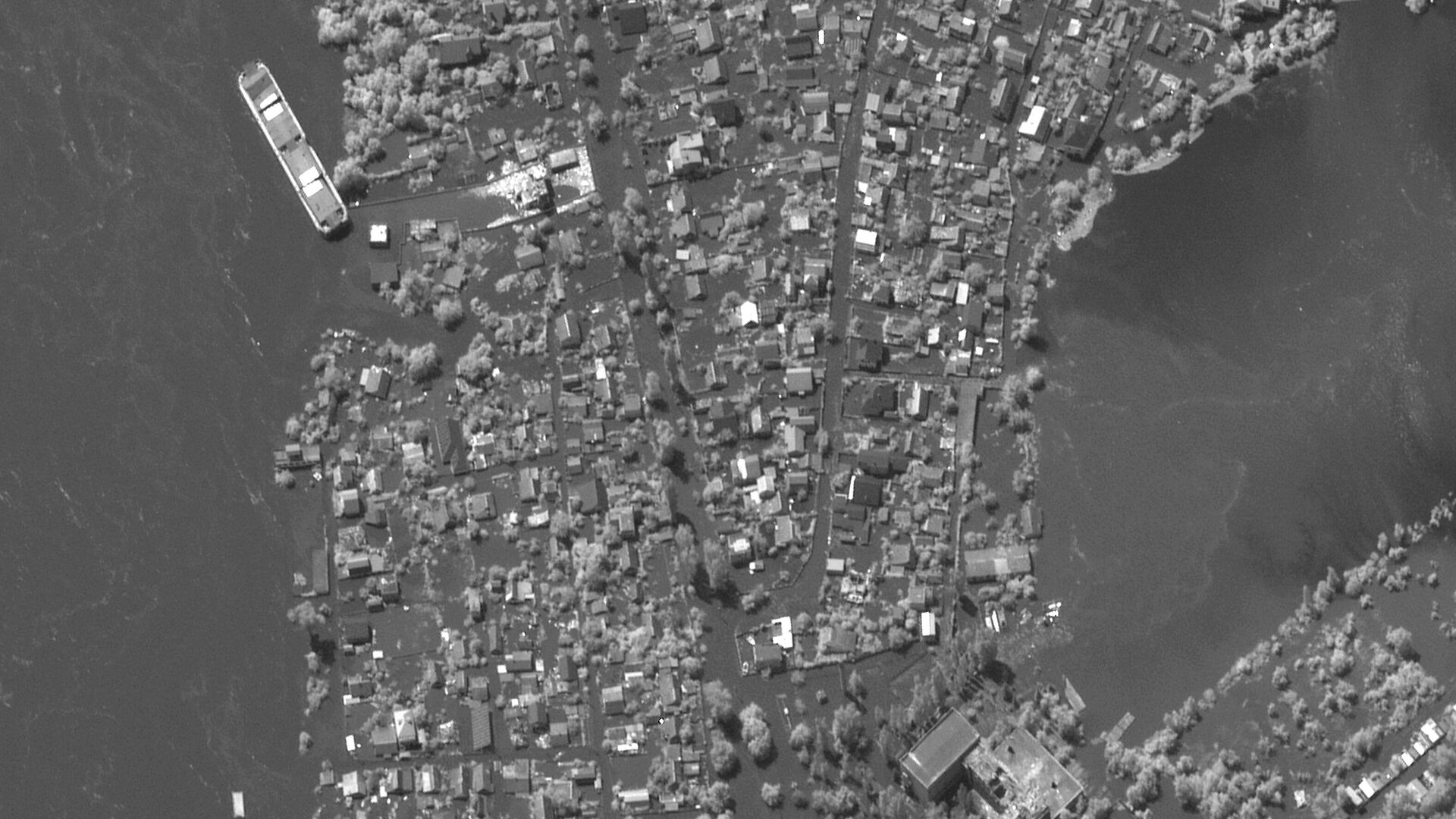Ukraine Had Motive and Intent to Destroy Novaya Kakhovka Dam

© Photo Maxar
Subscribe
Western leaders have dropped heavy hints that they back Kiev's claim about Russia "bombing" the Kakhovka dam. International relations and security analyst Mark Sleboda and author Jeremy Kuzmarov, editor of CovertAction magazine, said Kiev had many motives for destroy the dam and Moscow had every reason to defend it.
Ukraine had several motives for destroying a major hydroelectric dam on the Dnepr river and had already signalled its plans to do so, commentators say.
Ukrainian forces shelled and breached the Russian-controlled Novaya Kakhovka hydroelectric dam on the lower Dnepr river in the small hours of Tuesday morning, flooding several towns downstream.
Russian Defense Minister General Sergey Shoigu called the attack "another terrorist crime" by the "Kiev regime."
Shoigu said the purpose of the attack was to prevent Russian troops threatening the west bank of the Kherson region, thereby allowing the Ukrainian army to transfer forces from the Kherson region eastward to Zaporozhye, since reinforcements for its new southern "offensive" has suffered huge losses of men and equipment in its first three days.
Analyst Mark Sleboda told Sputnik that, after a year of Ukrainians threatening to collapse the dam, "they've finally done it."
"They've flooded the Dnepr. And I know they're denying they did it, just like they're denying they attacked the Crimean bridge, and they're denying they attacked the Kremlin and they deny they assassinated Darya Dugina and Vladen Tatarsky," Sleboda said.
"The Washington Post last year did an article where they admitted that the Kiev regime, talking to a regime military official, fired three HIMARS shots at the Novaya Kakhovka dam," he stressed. "They admitted it before and now they finally destroyed it."
The Ukrainian side had a clear motive for smashing the dam, he argued, for purely military benefits.
"It floods far more on the Russian side of the of the Dnepr there, the Russian held side, because it's much lower. So the flooding effects will be much greater on the Russian side," Sleboda pointed out. "The Russian defensive positions, the trenches, the minefields laid there are completely wiped out. When it drains out, then those Russian positions are just gone and the Kiev regime will find amphibious crossings, pontoon bridges, much more easy than they would have before."
The security expert also ventured that the rapidly-falling water level in the artificial reservoir behind the dam could "complicate" cooling for the Zaporozhye Nuclear Power Plant, the biggest in Europe, in Energodar on the Russian-controlled south-eastern bank of the Dnepr.
"I think there will be a big side push there, both amphibiously and on land towards Energodar to take the Zaporozhye nuclear power plant as well," Sleboda said. "That's not the main thrust but that will be an important other operation I believe."
A third downside for Russia was that breaching the dam cuts off the water supply to Crimea, which had only been restored 15 months earlier when Russian troops overran the Zaporozhye region and unblocked canals dammed by the Kiev regime since the peninsula voted to reunite with Russia in 2014.
"This will take years to repair. Crimea is once again going to be facing water shortages, which probably won't present a threat to life, but will severely curtail agriculture the the vineyards on the Crimean peninsula and may lead eventually to water rationing again at some point a couple of years down the road," Sleboda warned. "This is spite. This is, again, punishing the Crimean people for collectively for choosing wrong."
CovertAction magazine editor Jeremy Kuzmarov told Sputnik that the West's attempt to pin blame on Russia for the Novaya Kakhova attack bore echoes of its attempt to shift guilt for the Nord Stream pipeline bombing of September 2022 from the White House to the Kremlin.
"It's clearly Ukraine behind this attack," he said, pointing out that Moscow had been "trying to build up the economy of Crimea and connect the Russian economy with Crimea."
"They're not going to try and sabotage Crimea's economy, because that dam was supplying fresh water supplies," Kuzmarov said. "And Ukraine was known since 2014, since the Maidan coup and Crimea was reincorporated into Russia, they've been trying to cut off fresh water supply to Crimea since 2014."
"There have been so many lies told, including related to Nord Stream, that at this point a lot has come out about the Ukrainian government and their misdeeds," he added. "I think the public and even pro-war pundits are always framing their analysis... by acknowledging it wasn't a perfect government and they've done some bad things."
The editor drew another parallel to the post-WWII Nuremberg war crimes tribunal, where the many charges laid against German Nazi leaders included bombing dykes and dams in the occupied Netherlands. He argued that Ukrainian leaders were guilty of the same.
"This is a crime, a war crime. They're targeting infrastructure like with the Nord Stream pipeline, and they're trying to cruelly starve the people or deprive them of water supply to fill a broader political end, like in the case of Crimea, trying to cut it off from Russia," Kuzmarov said. "This is a very cruel policy by Ukraine. It should be an outrage in the world community."
For more cutting-edge commentary on world events, tune in to Sputnik Radio shows.

